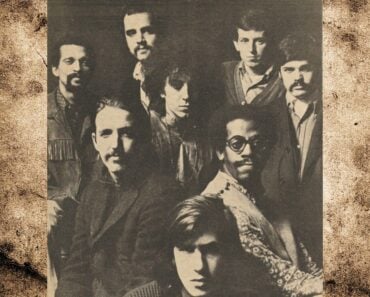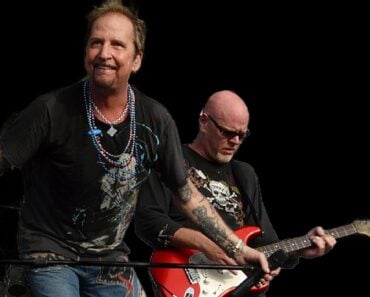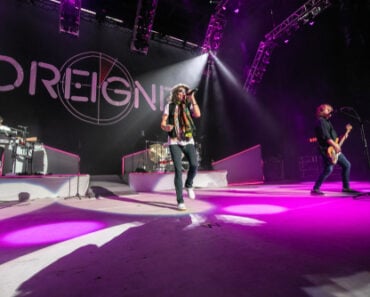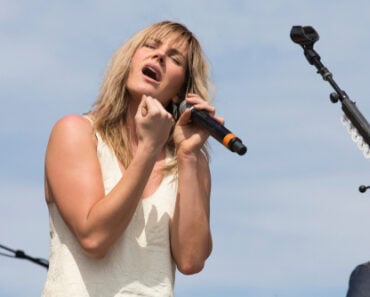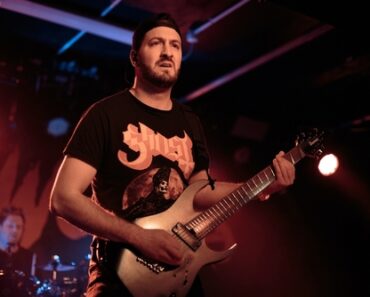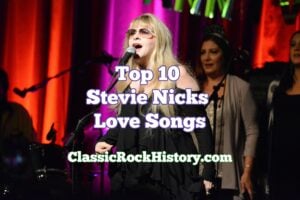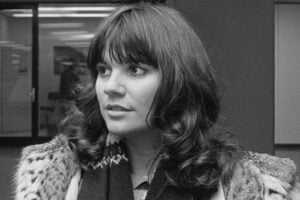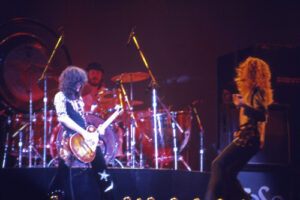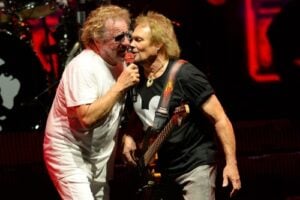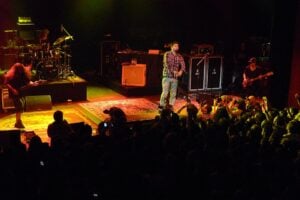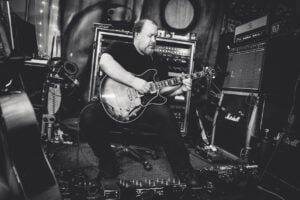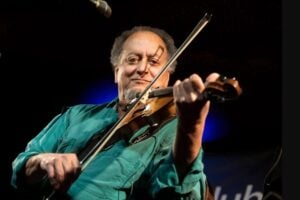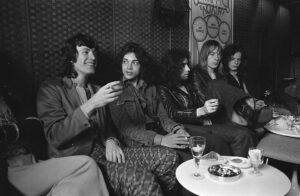
Feature Photo: Rob Mieremet, CC0, via Wikimedia Commons
When four teenagers converged at London’s Nag’s Head pub on April 19, 1968, for their first rehearsal and gig in the same evening, they unknowingly launched one of Britain’s most influential yet tragically short-lived rock bands. Free formed in London that spring with Paul Rodgers on vocals, Paul Kossoff on guitar, Andy Fraser on bass, and Simon Kirke on drums, becoming pioneers of the British hard rock movement alongside Led Zeppelin and Cream. The band released six studio albums between 1969 and 1973, selling over 20 million records worldwide and performing in more than 700 arenas and festival concerts. Their breakthrough came with their third album Fire and Water (1970), which reached number 2 in the UK and spawned the iconic hit “All Right Now,” a number 1 single in over 20 territories that helped secure their legendary performance at the 1970 Isle of Wight Festival before an audience of 600,000.
Free’s commercial peak was matched by internal turmoil, with the band disbanding in 1971, reforming briefly in 1972, and finally splitting permanently in 1973. Their chart success included Fire and Water reaching number 17 on the US Billboard 200, while their single “My Brother Jake” hit number 4 on the UK Singles Chart in 1971. The compilation album The Free Story reached number 2 on the UK Albums Chart in 1973 and was certified silver by the British Phonographic Industry. Despite their brief five-year run, Free’s legacy endures through “All Right Now,” which ASCAP recognized for receiving over one million radio plays in the US by 1989, and their influence on countless rock acts that followed.
The band’s aftermath saw mixed fortunes among its members, with Paul Rodgers and Simon Kirke achieving massive success in Bad Company, while guitarist Paul Kossoff’s struggles with drug addiction led to his tragic death in 1976 at age 25. Rolling Stone has described Free as pioneers of British hard rock, ranking Paul Rodgers at number 55 on its list of the 100 Greatest Singers of All Time and Paul Kossoff at number 51 on its list of the 100 Greatest Guitarists of All Time. The band’s six studio albums, two live albums, and numerous compilations continue to influence rock musicians decades after their dissolution.
Paul Rodgers
Paul Bernard Rodgers was born on December 17, 1949, in Middlesbrough, England, and became Free’s founding vocalist when he was just 18 years old. Before Free, Rodgers played in local bands including The Roadrunners, which changed its name to The Wildflowers before he moved to London’s music scene. When Paul Kossoff saw Rodgers singing with his band Brown Sugar at the Fickle Pickle club in London’s Finsbury Park, he was immediately impressed and asked to jam onstage with him. This chance encounter in 1968 led to the formation of Free, where Rodgers served as lead vocalist throughout the band’s entire existence from 1968 to 1973.
Rodgers performed on all six of Free’s studio albums: Tons of Sobs (1969), Free (1969), Fire and Water (1970), Highway (1970), Free at Last (1972), and Heartbreaker (1973). His most significant contribution was co-writing “All Right Now” with bassist Andy Fraser, which became a number 1 hit in over 20 territories and was recognized by ASCAP in 1990 for garnering over 1,000,000 radio plays in the United States. During Free’s 1972 reformation, when Paul Kossoff’s drug problems became severe, Rodgers temporarily took over guitar duties in addition to his vocal responsibilities. His powerful, soulful voice became the defining element of Free’s sound and helped establish what would later be called the British blues-rock movement.
After Free’s final disbandment in 1973, Rodgers immediately formed Bad Company with Simon Kirke and achieved even greater commercial success throughout the 1970s and beyond. He later explored various musical projects including The Firm (with Jimmy Page), The Law, and a successful collaboration with Queen as Queen + Paul Rodgers. In 2017, Rodgers embarked on a Free Spirit UK Tour, performing songs strictly from the Free catalogue, culminating in a sold-out show at London’s Royal Albert Hall. Rolling Stone magazine has ranked him number 55 on its list of the 100 Greatest Singers of All Time, and he has been dubbed “The Voice” by his fans. Rodgers continues to tour and record, maintaining his status as one of rock’s most enduring vocalists.
Paul Kossoff
Paul Francis Kossoff was born on September 14, 1950, in Hampstead, London, the son of actor David Kossoff. At just 17 years old, he co-founded Free after meeting Simon Kirke while both were playing in the R&B band Black Cat Bones. Kossoff began classical guitar lessons at age nine and continued until fifteen, when he was inspired to switch to electric guitar after seeing Eric Clapton with John Mayall’s Bluesbreakers in December 1965. This encounter led him to purchase a Gibson Les Paul guitar, which would become his signature instrument and help define Free’s sound.
Kossoff was Free’s lead guitarist throughout their existence from 1968 to 1973, contributing to all six studio albums. His guitar work was characterized by exceptional vibrato and melodic phrasing that influenced countless guitarists. He co-wrote several Free songs, including “Oh I Wept” and “Mr Big” on the Fire and Water album. During the recording sessions for Fire and Water, his interplay with Paul Rodgers’ vocals created some of rock’s most memorable moments, particularly on tracks like “All Right Now” and the album’s title track. However, Kossoff’s drug use began affecting his reliability during Free’s later years, particularly after their initial success.
During Free’s 1971 hiatus, Kossoff teamed up with Simon Kirke, Tetsu Yamauchi, and John “Rabbit” Bundrick to form Kossoff, Kirke, Tetsu and Rabbit, releasing one self-titled album in 1971. When Free reformed in 1972, Kossoff’s drug problems had worsened significantly, making him increasingly unreliable for recording and touring. He was replaced by ex-Osibisa guitarist Wendell Richardson for Free’s final US tour in 1973. After Free’s dissolution, Kossoff formed Back Street Crawler and released several albums, but his addiction continued to deteriorate his health. On March 19, 1976, while on a flight from Los Angeles to New York, Paul Kossoff died from a pulmonary embolism at the age of 25. In 2010, he was posthumously ranked number 51 in Rolling Stone’s list of the 100 Greatest Guitarists of All Time.
Andy Fraser
Andrew McIan Fraser was born on July 3, 1952, in the Paddington area of Central London to a Barbadian/Guyanese father of mixed European and African ancestry and an English mother. At the remarkable age of 15, Fraser became Free’s bassist when the band formed in 1968, making him the youngest member of the group. Before joining Free, Fraser had already gained significant experience playing with John Mayall’s Bluesbreakers, which impressed his future bandmates and helped him secure the position. His introduction to Free came through Alexis Korner’s daughter Sappho, who recommended the talented young musician to the forming band.
Fraser was instrumental in Free’s songwriting, serving as Paul Rodgers’ primary collaborator throughout their career together. His most significant contribution was co-writing and producing “All Right Now” with Rodgers, which became Free’s signature song and a number 1 hit in over 20 territories. He appeared on Free’s first five studio albums: Tons of Sobs (1969), Free (1969), Fire and Water (1970), Highway (1970), and Free at Last (1972). Fraser played both bass and piano on these recordings, showcasing his versatility as a musician. His bass playing provided the rhythmic foundation for Free’s blues-rock sound, while his songwriting partnership with Rodgers produced many of the band’s most memorable tracks.
Fraser left Free in mid-1972, frustrated by Paul Kossoff’s unreliability due to his drug problems. His departure marked a significant turning point for the band, as he had been their primary creative force alongside Rodgers. After leaving Free, Fraser formed Sharks with vocalist Snips and guitarist Chris Spedding, but left after their debut album First Water (1973). He then formed the Andy Fraser Band, releasing two albums in 1975 before relocating to California to focus on songwriting. Fraser went on to write hits for major artists including Robert Palmer, Joe Cocker, Chaka Khan, Rod Stewart, and Paul Young. His post-Free career proved highly successful as a songwriter, though he never again achieved the same level of performance success. Andy Fraser died on March 16, 2015, at the age of 62.
Simon Kirke
Simon Frederick St George Kirke was born on July 28, 1949, in Lambeth, South London, and became Free’s drummer and the only member to remain with the band throughout its entire existence. Before Free, Kirke played in the R&B band Black Cat Bones alongside Paul Kossoff, where they developed their musical partnership and friendship. After leaving school at 17, he returned to London to find work in the booming blues scene, and after a frustrating 22-month search, he was offered the drumming position in Black Cat Bones. When Kirke and Kossoff decided to form a new band, they recruited Paul Rodgers and Andy Fraser to create Free.
Kirke was Free’s steady rhythmic backbone throughout their career from 1968 to 1973, appearing on all six studio albums and providing reliable drumming despite the chaos surrounding the band’s later years. His drumming style was characterized by solid, blues-influenced rhythms that perfectly complemented the band’s sound without overshadowing the other members. While he contributed little in terms of songwriting compared to his bandmates, he was highly accomplished as a drummer and occasional backing vocalist, particularly during Free’s later reformation period. Kirke witnessed and endured the band’s internal struggles, particularly Paul Kossoff’s drug addiction and the tensions between Andy Fraser and Paul Rodgers.
During Free’s 1971 hiatus, Kirke joined with Paul Kossoff, Tetsu Yamauchi, and John “Rabbit” Bundrick to form the group Kossoff, Kirke, Tetsu and Rabbit, which released one self-titled album. When Free reformed in 1972, Kirke remained committed to helping save Kossoff from his drug addiction, though these efforts ultimately proved unsuccessful. After Free’s final dissolution in 1973, Kirke co-founded Bad Company with Paul Rodgers and achieved massive commercial success throughout the 1970s and beyond. His post-Free career has been highly successful, making him one of rock’s most enduring drummers. Kirke has also worked with Ringo Starr’s All Star Band on three occasions and released a solo album, Seven Rays of Hope, in 2005. He continues to perform and remains the last surviving member of Free’s classic lineup alongside Paul Rodgers.
Tetsu Yamauchi
Tetsu Yamauchi was born on October 21, 1946, in Fukuoka, Japan, and joined Free as bassist in 1972, replacing Andy Fraser who had left due to frustrations with Paul Kossoff’s unreliability. Before joining Free, Yamauchi played with Mickey Curtis and his band Samurai in the late 1960s, gaining experience in the Japanese rock scene. His entry into Free’s story began during the band’s 1971 hiatus when he collaborated with Paul Kossoff, Simon Kirke, and John “Rabbit” Bundrick on the album Kossoff, Kirke, Tetsu and Rabbit, which showcased his bass playing abilities to his future Free bandmates.
Yamauchi officially joined Free in 1972 and appeared on their final studio album, Heartbreaker (1973), which reached number 9 in the UK charts. His bass playing provided a different dynamic than Andy Fraser’s style, contributing to a heavier, more rock-oriented sound on Free’s final recordings. Despite being a skilled musician, Yamauchi faced significant challenges within the band due to Paul Kossoff’s deteriorating condition and the tensions between the remaining members, particularly between Paul Rodgers and keyboardist John Bundrick. The language barrier also created communication difficulties within the band, though his musical contributions were solid and professional.
When Free embarked on their final tour to support Heartbreaker, Paul Kossoff was too ill to participate and was replaced by Wendell Richardson. This tour proved to be Free’s last, ending at the Hollywood Sportatorium in Florida on February 17, 1973. After Free’s dissolution, Yamauchi joined the Faces, replacing Ronnie Lane, where he appeared on their final single “You Can Make Me Dance, Sing or Anything” and the live album Coast to Coast: Overture and Beginners. His time with both Free and the Faces, while brief, placed him at the center of British rock history during a pivotal period. Yamauchi retired from music in the late 1990s and relocated to the countryside with his family, choosing to live a quiet, religious life and declining to participate in any reunions or press interviews.
John “Rabbit” Bundrick
John Douglas “Rabbit” Bundrick was born on November 21, 1948, and became Free’s keyboardist during their final period from 1972 to 1973. Before joining Free, Bundrick had already established himself as a versatile session musician, touring and recording with Texan vocalist Johnny Nash and playing on Nash’s hit single “I Can See Clearly Now” in 1972. His connection to Free began during the band’s 1971 hiatus when he collaborated with Paul Kossoff, Simon Kirke, and Tetsu Yamauchi on the album Kossoff, Kirke, Tetsu and Rabbit, which demonstrated his keyboard skills and musical compatibility with the Free rhythm section.
When Free reformed in 1972, Bundrick was brought in as the band’s fifth member, adding keyboards to their sound for the first time and appearing on their final album, Heartbreaker. His keyboard work expanded Free’s sonic palette, contributing organ, piano, and Mellotron to their blues-rock foundation. Bundrick wrote two songs on Heartbreaker and demanded creative input as a full band member rather than just a session musician. However, this assertiveness led to significant tensions with Paul Rodgers, resulting in frequent conflicts and even physical altercations during the band’s final American tour. Despite these personality clashes, Bundrick’s musical contributions were substantial and helped define Free’s final sound.
Bundrick’s conflicts with Rodgers became so severe that he reportedly spent much of Free’s final US tour “tending his wounds” from their frequent fights. The irony was that despite their personal animosity, Bundrick’s organ sound fitted perfectly with Rodgers’ voice, and Rodgers sang Bundrick’s compositions better than anyone else ever has. After Free’s dissolution in 1973, Bundrick went on to achieve his greatest fame as keyboardist for The Who, beginning in the mid-1970s and continuing intermittently for decades. His notable work includes playing on The Who’s album Endless Wire (2006) and their Super Bowl XLIV halftime show performance in 2010. Bundrick’s versatility has also led to collaborations with Eric Burdon, Bob Marley and the Wailers, Roger Waters, and many other prominent artists, establishing him as one of rock’s most respected session musicians.
Wendell Richardson
Wendell Richardson joined Free as guitarist for their final tour in 1973, replacing Paul Kossoff who was too ill from drug-related health problems to perform. Richardson, who was a member of the Afro-rock band Osibisa, was brought in specifically for Free’s American tour supporting the Heartbreaker album. His appointment represented a significant departure from Free’s usual sound, as his style was quite different from Kossoff’s blues-influenced approach. The tour lineup included Paul Rodgers on vocals, Richardson on lead guitar, Simon Kirke on drums, John “Rabbit” Bundrick on keyboards, and Tetsu Yamauchi on bass.
Richardson’s inclusion was described by some observers as “a strange choice that frankly was doomed from the start,” primarily because his musical background with Osibisa’s Afro-rock sound was fundamentally different from Free’s blues-rock foundation. The tour proved extremely difficult, with Free performing twenty consecutive concerts during Richardson’s tenure, including a show at Albuquerque’s Johnson Gym on January 28, 1973. The physical and emotional strain of replacing such an iconic guitarist under these circumstances, combined with the band’s internal problems, made Richardson’s position nearly impossible.
Free’s final tour ended at the Hollywood Sportatorium in Florida on February 17, 1973, marking both Richardson’s last performance with the band and Free’s final concert ever. Richardson’s brief tenure with Free represents one of rock history’s most challenging replacement situations, as he was asked to fill the shoes of a beloved and influential guitarist during the band’s most troubled period. After Free’s dissolution, Richardson returned to Osibisa and continued his career in Afro-rock music. His short time with Free, while difficult, places him in the unique position of being the last guitarist to perform with the legendary British blues-rock pioneers.
Check out more Free articles on ClassicRockHistory.com Just click on any of the links below……
Top 10 Free Songs
Paul Rodgers: The ClassicRockHistory.com Interview
Read More: Artists’ Interviews Directory At ClassicRockHistory.com
Read More: Classic Rock Bands List And Directory



